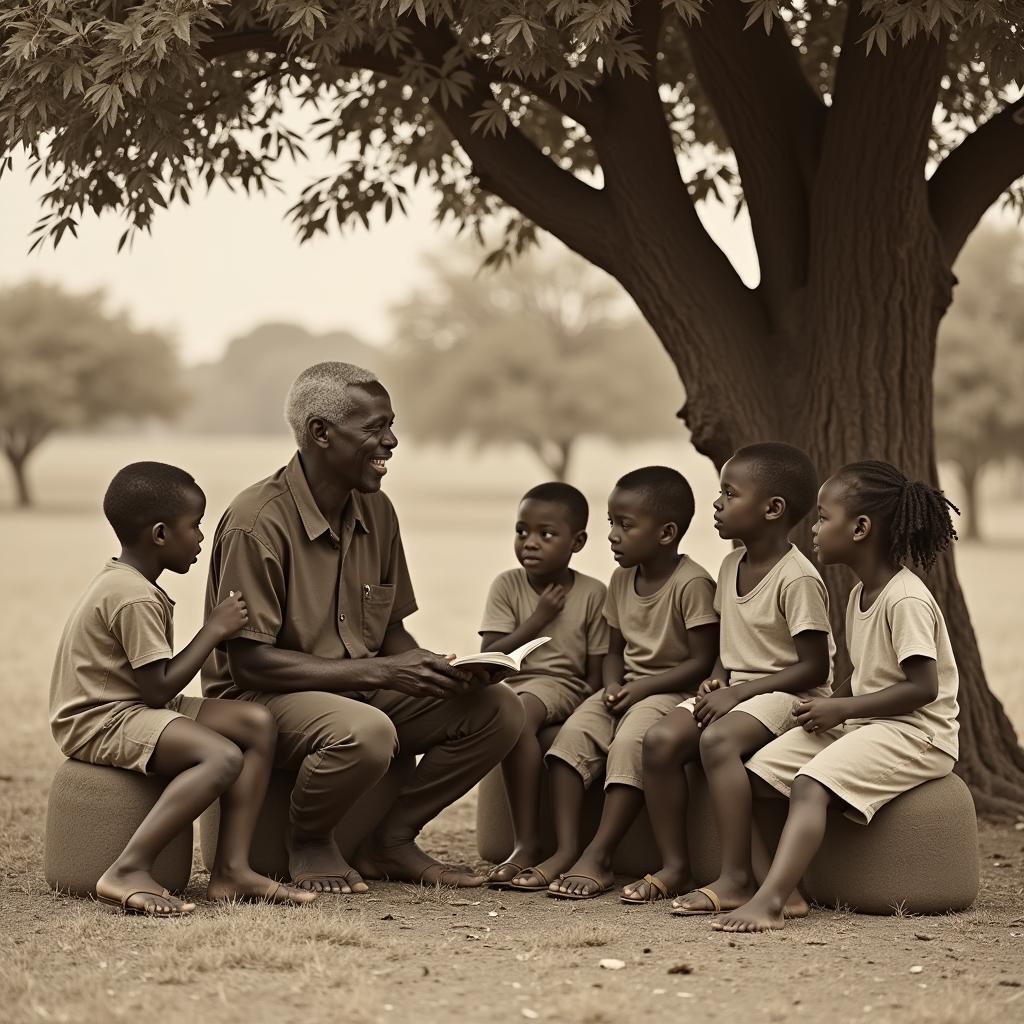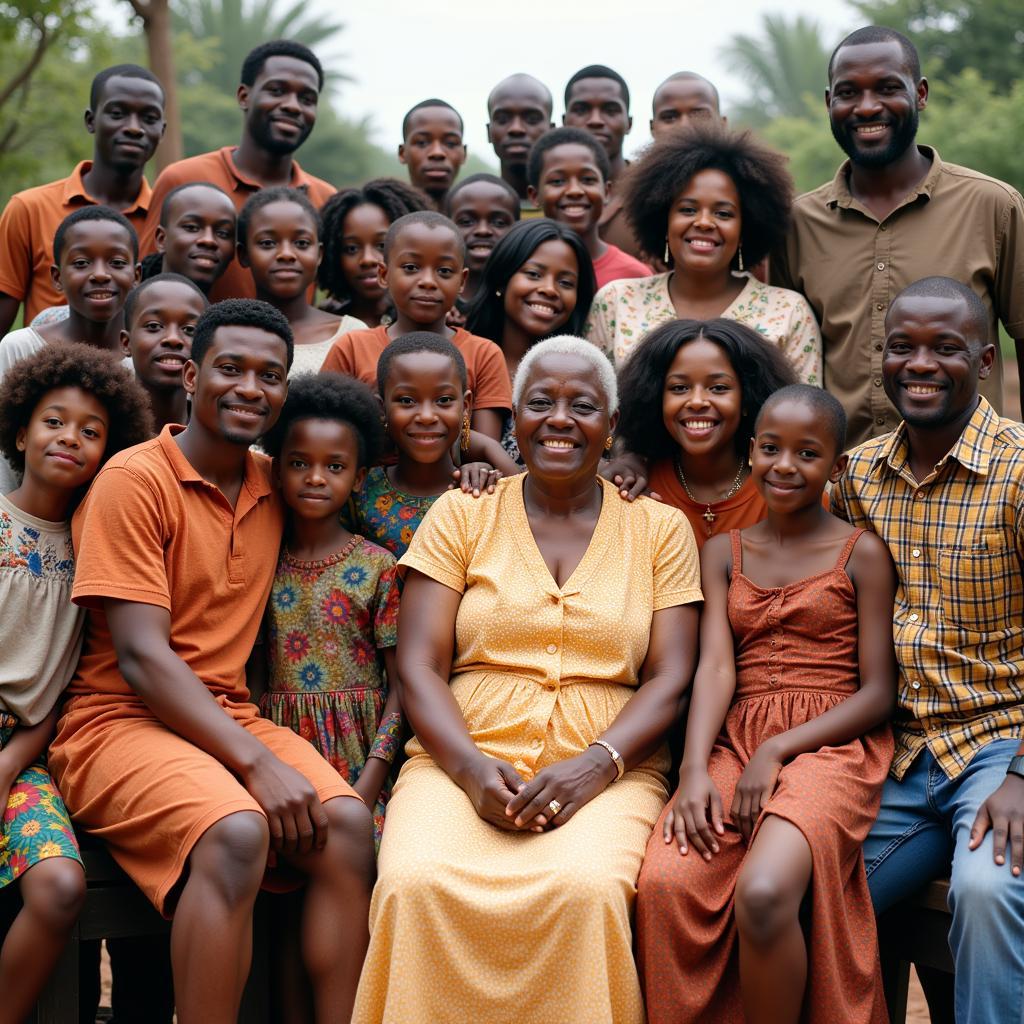African Grandparents in the 1980s: A Glimpse into Family Life
African grandparents in the 1980s held a position of profound respect and influence within the family structure. Their wisdom, gleaned from decades of navigating life’s complexities within their respective communities, was invaluable. They were the keepers of traditions, the storytellers, and the anchors of family life. This article delves into the roles and significance of African grandparents during this era, exploring their contributions to childcare, education, and cultural preservation.
The vital role of African grandparents in the 1980s extended beyond the immediate family, often reaching into the broader community. Their presence was felt in social gatherings, religious ceremonies, and even in the resolution of disputes, demonstrating their integral role in the social fabric of African Life. Their experience and wisdom provided guidance and stability during a period marked by significant social and political changes across the continent.
The Heart of the Home: Grandparents’ Role in Childcare
In many African societies, grandparents played, and continue to play, a crucial role in childcare. Often, parents, particularly in rural areas or when facing economic hardship, relied on grandparents for the daily care of their children. This allowed parents to work or pursue other responsibilities, knowing their children were in loving and capable hands. Grandparents nurtured, disciplined, and instilled core values in their grandchildren, ensuring the continuity of cultural traditions and family values.
The bond between grandparents and grandchildren in African culture is often profoundly deep. Grandchildren learned valuable life lessons through storytelling, observing daily routines, and participating in family activities. This close relationship fostered a sense of belonging and identity, connecting the younger generations to their heritage and ancestry.
Passing Down Traditions: Grandparents as Educators
African grandparents in the 80s were not just caregivers; they were educators in the truest sense. They passed down invaluable knowledge about their culture, history, and traditions. Through captivating stories, songs, and proverbs, they shared wisdom accumulated over generations, imparting moral lessons, social etiquette, and practical skills. This oral tradition was a cornerstone of education, especially in communities with limited access to formal schooling.
Grandparents taught essential life skills, from farming and cooking to crafts and traditional medicine. These skills were not only practical but also served to connect the younger generation to their heritage and ensure the survival of cultural practices. They instilled respect for elders, community values, and a strong sense of identity.
Maintaining Cultural Heritage: Grandparents as Guardians of Tradition
In a rapidly changing world, African grandparents acted as guardians of cultural heritage in the 1980s. They preserved and transmitted traditional customs, rituals, and beliefs, ensuring their continuity amidst modernization and external influences. Their knowledge of traditional medicine, music, dance, and storytelling kept these vital aspects of African culture alive.
Grandparents often played a significant role in religious and spiritual practices, passing down beliefs and rituals that connected families to their ancestors and spiritual heritage. They were instrumental in maintaining the integrity of cultural practices and ensuring they were not lost to the tides of change.
 African Grandparents Sharing Stories in the 1980s
African Grandparents Sharing Stories in the 1980s
What was the typical role of African grandparents in families during the 1980s?
Typically, African grandparents played a central role in family life during the 1980s. They were often responsible for childcare, passing down cultural traditions, and providing guidance and support to younger family members.
How did African grandparents contribute to education in the 1980s?
African grandparents in the 1980s served as crucial educators, transmitting knowledge, skills, and values through oral traditions, storytelling, and practical instruction. They shared their accumulated wisdom and experience, shaping the development of younger generations.
african american boy cabbage patch doll
Conclusion: The Enduring Legacy of African Grandparents
African grandparents in the 1980s played a pivotal role in family and community life, shaping the future by nurturing the present and preserving the past. Their contributions to childcare, education, and cultural preservation were invaluable. Understanding their influence provides a deeper appreciation for the strength and resilience of African families and the importance of intergenerational connections. Remembering and honoring the legacies of these grandparents is crucial to appreciating the rich tapestry of African culture. African grandparents in the 1980s truly were the heart and soul of their families.
FAQ
- What were some common challenges faced by African grandparents in the 1980s?
- How did urbanization and migration impact the role of grandparents in African families during this period?
- What are some examples of traditional skills and knowledge passed down by grandparents in the 1980s?
- How did the political and social climate of the 1980s in Africa affect family structures and the role of grandparents?
- What are some ways to preserve and celebrate the legacy of African grandparents today?
- How has the role of grandparents in Africa evolved since the 1980s?
- What are some resources available for learning more about African family history and traditions?
 African Grandparents with Family in the 1980s
African Grandparents with Family in the 1980s
For further insights, consider exploring articles on family structures in different African cultures and the impact of social change on intergenerational relationships.
Need help with preserving your family history or connecting with African cultural resources? Contact us! Phone: +255768904061, Email: [email protected] Or visit us at: Mbarali DC Mawindi, Kangaga, Tanzania. We offer 24/7 customer support.
